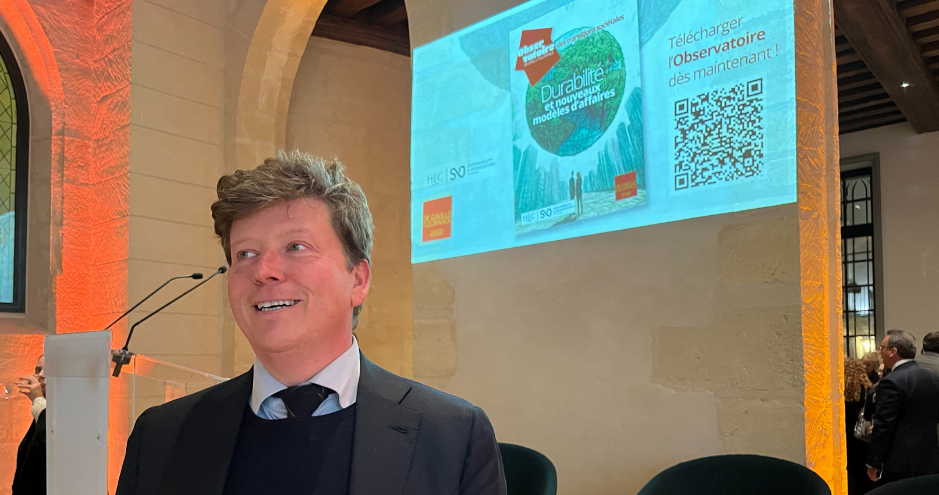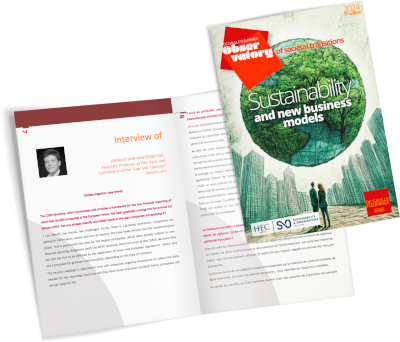Climate Litigation and New European Directives: Companies at a Major Turning Point
The CSRD directive requires over 50,000 companies in Europe to provide harmonized non-financial reporting, while the duty of vigilance directive redefines their responsibilities across the entire value chain. As part of our partnership with De Gaulle Fleurance for the 5th edition of the 2024 Observatory of Societal Transitions, Arnaud Van Waeyenberge, Professor of Law at HEC Paris, analyzes the impacts of these regulations, the operational challenges for companies, and emerging trends in climate litigation on a global scale.

Climate Litigation: New Trends
The CSRD Directive, which harmonises and provides a framework for the non-financial reporting of more than 50,000 companies in the European Union, has been gradually coming into force since 1st January 2024. Can you already identify any initial trends in the way companies are applying it?
I can identify two trends, two challenges. Firstly, there is a growing awareness. Companies are asking for information, advice and turn to experts. We have really moved into the implementation phase. This is particularly the case for the largest companies, which were already subject to nonfinancial reporting obligations (with the NFRD directive, the forerunner of the CSRD). Because they are also the first to be affected by the application of these new European regulations - which sets out a timetable for gradual implementation, depending on the type of company.
The second challenge is operational: how will companies organise themselves to collect the data needed for this reporting? And how will they have these indicators verified? Many companies are not yet ready for this.
In particular, is there a real interoperability between European standards and the international standards laid down by the ISSB, so that companies don't have to report twice on non-financial issues?
There is a political will and an effort to align the ISSB (International Sustainability Standards Board) and the EFRAG (European Financial Reporting Advisory Group). These two institutions communicate, trying to converge so that companies do not have to produce two different reports, which would be very burdensome for them.
Beyond this political will, there are substantive disagreements. For example, these two institutions do not have the same vision on the issue of "dual materiality". Should a company take into account only the impact of social and environmental issues on its economic performance (or financial materiality)? In other words, what will it cost to switch to electric motors and sustainable energy, for example? Or should it also take into account the company's impact on the environment and on people (or impact materiality)? The ISSB only wants to take financial materiality into account. The European Union wants a set of standards that can take into account this double materiality: what it costs companies, but also the impact on society and the environment. There is a substantive disagreement on this issue. However, in line with this political will to cooperate, the EFRAG and the ISSB have published, in May 2024, a guide on the interoperability of standards in order to facilitate compliance by companies.
On 24 April 2024, the European Parliament adopted the proposal for a European Directive on due diligence. What does this mean for European companies, and French companies in particular?
Under this directive, European companies are required to exercise due diligence with regard to fundamental rights and environmental protection throughout their value chain. They must prevent, mitigate and eliminate negative impacts by taking appropriate measures.
The implementation of these obligations mainly involves the drafting of codes of conduct, guidelines and a whole series of documents designed to identify risks and address them.
In terms of control, the Member States must set up supervisory authorities that can impose fines of up to 5% of global turnover on companies that fail to comply with these obligations. This is a major change compared with previous CSR regulations, which were more incentive than coercive. In addition, citizens or aggrieved parties can hold companies civilly liable on this basis. Hence, there is both state control through supervisory authorities and more horizontal control by citizens.
France adopted a law on the duty of due diligence in 2017, among the first countries in Europe – just after the United Kingdom and its Modern Slavery Act in 2015. It has therefore prepared its companies for this paradigm shift. As the European directive has many points in common with the French regulations, French companies have an advantage over other European companies, as they have already had to comply with this type of exercise for several years.
What are the trends in climate litigation around the world? What lessons can companies learn from this litigation?
Climate litigation continues, and new trends are emerging(1): The first of these is that we are continuing to see an increase in the number of disputes, with 230 new cases in 2023.
2nd trend: there is a diversification of the players taking legal actions. Whereas environmental or human rights protection NGOs were essentially in charge, we are now seeing civil society as a whole taking up this climate litigation: young isolated activists, companies, municipalities, etc.
3rd trend: fundamental rights are becoming an increasingly common legal basis for legal action. The argument used consists in proving that failure to respect the environment constitutes an attack on life, health or the right to a healthy environment for individuals. In 2023, an association of women of the 3rd age, Klimat Seniorinnen, took Switzerland to the European Court of Human Rights (ECHR) for its lack of climate action, before the European Court of Human Rights (ECHR). The ECHR recognised the link between climate change and fundamental rights. This is a landmark decision. Judges in the 46 European countries that are members of the ECHR will be able to refer to this case law.
4th trend: we are witnessing a geographical expansion of this climate litigation in Asia and Latin America.
5th trend: decisions are increasingly in favour of plaintiffs. The link between the inaction of companies or governments and the impacts of climate change is being recognised. This is creating legal precedents.
And finally, we are witnessing the emergence of a new type of litigation: cases where the objective is no longer to fight climate change but, on the contrary, to halt action against climate change. For example, some cases call into question the integration of climate risk into financial decisionmaking. Plaintiffs are using this litigation to try to turn back the clock to an industrial era that did not take the environment into account.
In another example, legal action is being taken against NGOs, investigative journalists and shareholder activists, with the aim of dissuading them from continuing their work. Companies will take them to court for defamation, for example, with resources that are out of all proportion to those of an NGO or journalist. The phenomenon is significant: according to a survey conducted by the Foreign Policy Center, 73% of investigative journalists in 41 countries have reported to have been subject of legal threats.
A 3rd type of dispute, "green versus green", pits different environmental objectives against each other. A policy to combat global warming, for example, is accused of harming biodiversity. The judge is then asked to make a decision and strike a balance between these different objectives.
(1) For an excellent analysis of these, see the reports produced by the Grantham Institute, which have also been used as a basis for our discussion.

Find more: